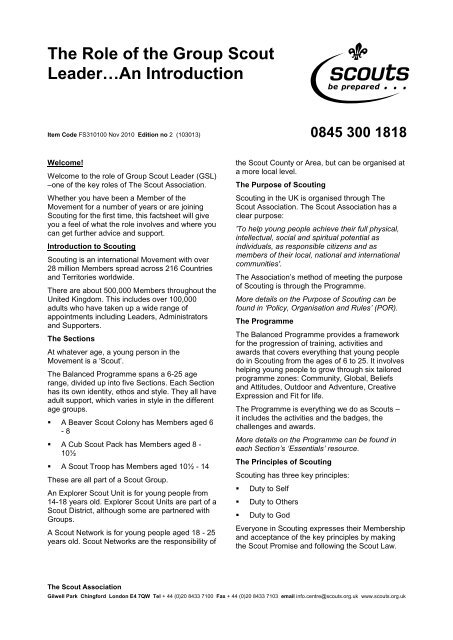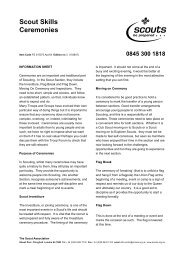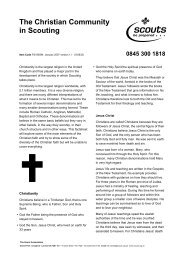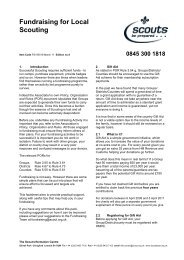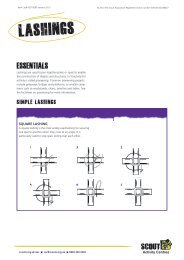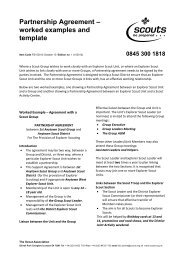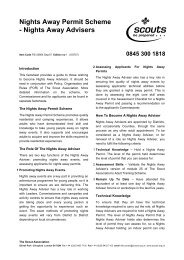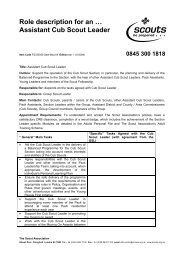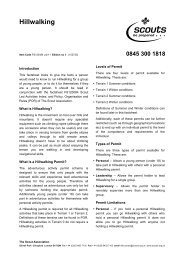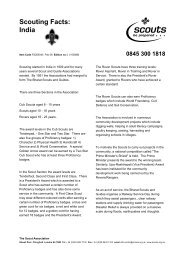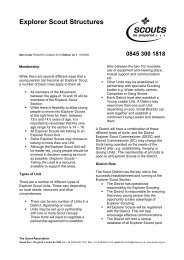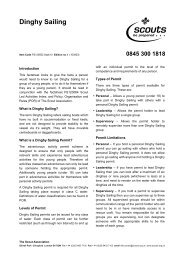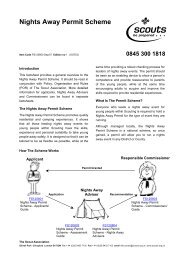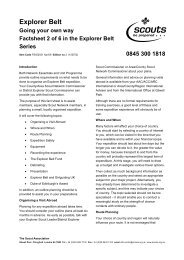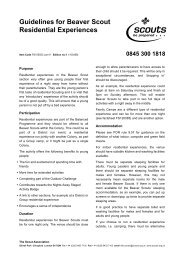Factsheet - ScoutBase UK
Factsheet - ScoutBase UK
Factsheet - ScoutBase UK
Create successful ePaper yourself
Turn your PDF publications into a flip-book with our unique Google optimized e-Paper software.
The Role of the Group Scout<br />
Leader…An Introduction<br />
S<br />
Item Code FS310100 Nov 2010 Edition no 2 (103013) 0845 300 1818<br />
Welcome!<br />
Welcome to the role of Group Scout Leader (GSL)<br />
–one of the key roles of The Scout Association.<br />
Whether you have been a Member of the<br />
Movement for a number of years or are joining<br />
Scouting for the first time, this factsheet will give<br />
you a feel of what the role involves and where you<br />
can get further advice and support.<br />
Introduction to Scouting<br />
Scouting is an international Movement with over<br />
28 million Members spread across 216 Countries<br />
and Territories worldwide.<br />
There are about 500,000 Members throughout the<br />
United Kingdom. This includes over 100,000<br />
adults who have taken up a wide range of<br />
appointments including Leaders, Administrators<br />
and Supporters.<br />
The Sections<br />
At whatever age, a young person in the<br />
Movement is a „Scout‟.<br />
The Balanced Programme spans a 6-25 age<br />
range, divided up into five Sections. Each Section<br />
has its own identity, ethos and style. They all have<br />
adult support, which varies in style in the different<br />
age groups.<br />
• A Beaver Scout Colony has Members aged 6<br />
- 8<br />
• A Cub Scout Pack has Members aged 8 -<br />
10½<br />
• A Scout Troop has Members aged 10½ - 14<br />
These are all part of a Scout Group.<br />
An Explorer Scout Unit is for young people from<br />
14-18 years old. Explorer Scout Units are part of a<br />
Scout District, although some are partnered with<br />
Groups.<br />
A Scout Network is for young people aged 18 - 25<br />
years old. Scout Networks are the responsibility of<br />
the Scout County or Area, but can be organised at<br />
a more local level.<br />
The Purpose of Scouting<br />
Scouting in the <strong>UK</strong> is organised through The<br />
Scout Association. The Scout Association has a<br />
clear purpose:<br />
'To help young people achieve their full physical,<br />
intellectual, social and spiritual potential as<br />
individuals, as responsible citizens and as<br />
members of their local, national and international<br />
communities'.<br />
The Association‟s method of meeting the purpose<br />
of Scouting is through the Programme.<br />
More details on the Purpose of Scouting can be<br />
found in „Policy, Organisation and Rules‟ (POR).<br />
The Programme<br />
The Balanced Programme provides a framework<br />
for the progression of training, activities and<br />
awards that covers everything that young people<br />
do in Scouting from the ages of 6 to 25. It involves<br />
helping young people to grow through six tailored<br />
programme zones: Community, Global, Beliefs<br />
and Attitudes, Outdoor and Adventure, Creative<br />
Expression and Fit for life.<br />
The Programme is everything we do as Scouts –<br />
it includes the activities and the badges, the<br />
challenges and awards.<br />
More details on the Programme can be found in<br />
each Section‟s „Essentials‟ resource.<br />
The Principles of Scouting<br />
Scouting has three key principles:<br />
• Duty to Self<br />
• Duty to Others<br />
• Duty to God<br />
Everyone in Scouting expresses their Membership<br />
and acceptance of the key principles by making<br />
the Scout Promise and following the Scout Law.<br />
The Scout Association<br />
Gilwell Park Chingford London E4 7QW Tel + 44 (0)20 8433 7100 Fax + 44 (0)20 8433 7103 email info.centre@scouts.org.uk www.scouts.org.uk
page 2 of 5<br />
The Scout Promise and Law give a distinctive<br />
ethos to the practices of the Movement and acts<br />
as a bond with Scouts worldwide.<br />
More details on the Fundamentals of Scouting can<br />
be found in the <strong>Factsheet</strong> FS140004<br />
„Fundamentals of Scouting‟.<br />
The role of the Group Scout Leader<br />
Policy, Organisation and Rules (POR)<br />
summarises the GSL as being responsible for “the<br />
continuity and development of training in Sections<br />
of the Group”, “the development of Scouting in the<br />
Group‟s catchment area” and “for supporting all<br />
the adults who work within the Group”.<br />
In addition, other responsibilities include:<br />
• maintaining effective communication with<br />
others whose advice and support can be of<br />
use to the Group;<br />
• acting as Chairman of the Group Leaders‟<br />
Meeting and encouraging co-operation among<br />
the Leaders of the Group;<br />
• nominating the Group Chairman and<br />
maintaining an effective Group Executive<br />
Committee in accordance with POR rule 3.23;<br />
• matters relating to the admission and<br />
membership of young people into the Group;<br />
• building and maintaining a good relationship<br />
with the Group‟s immediate community and, in<br />
the case of a Sponsored Scout Group, with<br />
the Sponsoring Authority and the community it<br />
represents.<br />
The Sections<br />
Each Section Leader within the Group is<br />
responsible for “planning and implementing a<br />
Balanced Programme” for their Section. However,<br />
this is “subject to the general supervision of the<br />
Group Scout Leader”.<br />
In this sense, the GSL becomes the key role<br />
linking the Sections. The GSL should provide<br />
obvious links between the Sections and ensure<br />
that young people move on between the Sections<br />
of the Group.<br />
To encourage the “development of training” the<br />
GSL needs to understand the purpose of<br />
providing a progressive Balanced Programme<br />
across all the Sections and continually monitor<br />
how each fits together.<br />
The GSL should actively encourage Sections to<br />
build on the skills learnt in previous sections and<br />
to prepare them for growth in Scouting terms as<br />
they move onto the next Section. The GSL also<br />
needs to be aware of the various rules and safety<br />
guidelines and ensure that the Leaders in the<br />
Group abide by them.<br />
The GSL should help to ensure that Section<br />
Leaders are encouraged to develop and introduce<br />
new ideas and activities. Above all, the GSL<br />
should help each Section, and indeed the Group<br />
as a whole, to continuously review its Programme<br />
to ensure that it is:<br />
• relevant and attractive;<br />
• easy to understand and operate;<br />
• progressive and accessible;<br />
• appealing to a wide range of young people;<br />
• meaningful and fulfilling;<br />
• safe and enjoyable.<br />
The Assistant District Commissioners for each<br />
Section (or District Leaders) can help with this too,<br />
as their role is to develop and support the<br />
Sections. A good working relationship with them<br />
will prove to be helpful.<br />
Links between the Sections<br />
You are responsible for ensuring the smooth<br />
transfer of young people from one section to<br />
another at the appropriate age.<br />
There are many things you can do to encourage<br />
links and effective communication between the<br />
Sections.<br />
For example, through your chairing of the Group<br />
Leaders‟ Meetings you can encourage the links<br />
between the Sections; encourage Group social<br />
events and joint events between Sections to<br />
create a family atmosphere within your Group.<br />
The GSL should ensure the progression and<br />
development for each young person across the<br />
Sections. The GSL should ensure that Section<br />
Leaders are supporting and encouraging Young<br />
people moving between the Sections as this is a<br />
crucial point for the retention of young people in<br />
Scouting.<br />
The GSL should also inform and encourage<br />
young people in the Group to move on to a District<br />
provision of Explorer Scouts when the time comes<br />
and it is important that you maintain good links<br />
with the District Explorer Scout Commissioner and<br />
their team.<br />
Supporting adults in the Group<br />
One of the key parts of the role of the GSL is<br />
managing adults in the Scout Group.
page 3 of 5<br />
Recruitment<br />
Recruitment of adults will be a key part of your<br />
role, ensuring that there are enough adults within<br />
the Group to ensure its effective operation is vital<br />
to the success and development of your Scout<br />
Group.<br />
More details on the recruitment of adults can be<br />
found in the publication BS320030 „Recruitment of<br />
Adult Volunteers‟.<br />
Your District will have an Appointments Advisory<br />
Committee whose role is to make adults feel<br />
welcome and to ensure that the appropriate<br />
checks have been carried out on them and<br />
undertake an independent assessment of an<br />
adult‟s suitability for their role.<br />
As GSL, you will be responsible for sponsoring<br />
and supporting adults through their appropriate<br />
Appointments Process.<br />
More details on the appointment of adults in the<br />
Scout Group and appropriate checks can be<br />
found in The Introduction and at the back of „POR‟<br />
and publication „POR: The Appointment Process-<br />
Appointing the Appointments Advisory<br />
Committee‟.<br />
Induction<br />
All adults in the Scout Group must feel valued and<br />
properly inducted if they are to remain members<br />
of the Movement. As GSL you should introduce<br />
them around, explain what meetings there are to<br />
attend, agree with them what their role will be and<br />
help them receive the training they need to carry<br />
out that role. A good induction will help them<br />
develop in their role and make them feel they are<br />
capable of carrying it out.<br />
More details on inducting adults in their role can<br />
be found in the publication BS320032 „Induction:<br />
starting adults in a new role‟.<br />
Support<br />
As a GSL, you will be a „line manager‟ for adults in<br />
the Scout Group. These adults will be responsible<br />
to you for their Scouting role, and as such it will be<br />
up to you to support them.<br />
Support in this context means:<br />
• Agreeing their role description;<br />
• Communicating with them;<br />
• Ensuring they have the appropriate equipment<br />
and resources for their role;<br />
• Being a source of advice;<br />
• Encouraging and motivating them.<br />
• Provide them with continuing support for their<br />
personal development and any further<br />
training.<br />
More details on how best to support adults can be<br />
found in the publication BS320031 „Support within<br />
Scouting‟.<br />
Review<br />
Regular and frequent reviews are an opportunity<br />
for you to discuss with those that you manage<br />
how they are getting on in their role and discuss<br />
„what happens next‟.<br />
Additionally, as GSL, you have a key role to play<br />
in the formal review of Appointed and local<br />
appointments in your Group at the end of an<br />
individual‟s period of appointment.<br />
The outcomes of such a review may involve<br />
renewing the appointment, reassigning the adult<br />
to another role or in some cases retirement from<br />
an active appointment.<br />
As well as formal appointment reviews, to help<br />
support your team, it is also helpful to have<br />
regular informal reviews (one to ones) to give<br />
constructive feedback and to allow them to<br />
address any issues of concern they might have.<br />
More details on both formal and informal reviews<br />
can be found in the publication BS320033<br />
„Review: Helping adults choose the Right Path‟.<br />
The Group Executive Committee<br />
The Scout Group is led by you, the GSL. The<br />
Group Executive Committee members are the<br />
charity trustees led by the Group Chairman.<br />
The Group Executive Committee exists to support<br />
the GSL in meeting the responsibilities of the<br />
appointment. The Executive Committee is<br />
responsible for:<br />
• the maintenance of the Group‟s property and<br />
equipment;<br />
• the raising of funds and the administration of<br />
the Group‟s finance;<br />
• the insurance of persons, property and<br />
equipment;<br />
• Group public occasions; and<br />
• assisting with the recruitment of Leaders and<br />
other adult support.<br />
The Group Chairperson (who is nominated by<br />
you) is a crucial partner in the management of the<br />
Group. A good working relationship with<br />
Chairperson will make your role easier.
page 4 of 5<br />
More details on the role and makeup of the Group<br />
Executive Committee can be found in „POR‟ and<br />
the factsheet „The Group Executive Committee‟.<br />
More details on insurance can be found in the<br />
publication „Insurance: an Insomniacs Guide‟<br />
available to download from www.unityins.co.uk.<br />
Finance, Equipment and Accommodation<br />
Finance is a key part of managing a Scout Group.<br />
An efficient Group Treasurer and fund raising<br />
team will relieve much of the pressure from<br />
Leaders. As GSL you should however be<br />
checking that monies are being properly<br />
accounted for and that Leaders are being<br />
reimbursed for any expenditure.<br />
Most Groups own a vast array of equipment. This<br />
needs to be adequately insured and stored safety.<br />
A good initial step would be to have the Group<br />
Secretary (or another appropriate person)<br />
establish and maintain an inventory of all<br />
equipment owned by the Group to ensure the<br />
correct care and storage of equipment and see<br />
what can be disposed of and what needs<br />
replacing. Funding can then be allocated for new<br />
items.<br />
Whether you own your own meeting place or rent<br />
it, there will be a number of things to consider.<br />
Having your own building can be an enormous<br />
benefit, but it can also be a huge drain on time<br />
and money. An early priority will be to ensure the<br />
Group have access to all the relevant deeds and<br />
insurance documentation. It would also be worth<br />
checking if the trusteeship of your building is<br />
vested with The Scout Trust Corporation, as this<br />
helps ensure continuity. If you rent your meeting<br />
place, make sure that there is a proper hire<br />
agreement and that adequate provision is made<br />
for the storage of group equipment.<br />
More details on vesting trusteeship with The<br />
Scout Association Trust Corporation can be found<br />
in the factsheet FS320600 „Scout Association<br />
Trust Corporation‟.<br />
District and County Support<br />
You will already have met your District<br />
Commissioner during your recruitment, but it is<br />
worthwhile making a special effort to find out<br />
about the communications facilities available and<br />
the way you can get to know what is happening at<br />
District and County level. By the same token, do<br />
make use of what is offered in the way of activities<br />
and facilities.<br />
Headquarters Support<br />
The Headquarters of the <strong>UK</strong> Scout Association is<br />
located at Gilwell Park in London. For help,<br />
advice and guidance and to find out what support<br />
is available to you call The Scout Information<br />
Centre on 0845 300 1818.<br />
The GSL virtual induction resource, in six parts,<br />
covers all the key aspects of the role. You can<br />
download the sessions in stages (eg once a<br />
month) or get them all in one go and use at your<br />
leisure.<br />
Also the Keys to Success: Group Scout Leaders<br />
booklet is designed to help explain the role of the<br />
GSL. It provides advice and support for you in<br />
your role. Other members of your Group may also<br />
find it useful.<br />
You can order printed copies of both from the<br />
Scout Information Centre or download them from<br />
www.scouts.org.uk/gslsupport.<br />
Another way of getting information is through<br />
Scouting magazine, which is published bi-monthly<br />
and sent free of charge to every adult Member of<br />
the Association. Support is also available online<br />
through our website www.scouts.org.uk where<br />
you can sign up to receive our e-mail Newsletter<br />
ScoutingPlus, and the Focus supplement with<br />
your Scouting magazine.<br />
Appointment and Training of GSLs<br />
The GSLs role is both responsible and<br />
demanding. It is not a figurehead appointment, but<br />
calls for the active and sensitive application of a<br />
wide range of management and leadership skills.<br />
It can be a very challenging role – but it can also<br />
be very rewarding!<br />
GSLs are not expected to be instant experts in<br />
everything, but over time you will be given the<br />
opportunity to gain new skills and ideas through<br />
informal support and training opportunities.<br />
Appointments are for an agreed fixed term and<br />
are subject to formal review by the District<br />
Commissioner. Your appointment, and its<br />
duration, should be done by mutual agreement<br />
between you and your line manager.<br />
The GSL‟s formal training needs are met through<br />
the agreement of a Personal Learning Plan with a<br />
Training Adviser. The training scheme is modular,<br />
and each of the relevant modules can be<br />
delivered in a variety of different methods to suit<br />
the individual concerned. On completion of your<br />
training you will be awarded a Wood Badge to<br />
mark your achievement.<br />
In addition, regular meetings of all the GSLs held<br />
by the District Commissioner enable GSLs to<br />
exchange ideas and help each other manage<br />
Scouting in their Scout Groups. Such contact can
page 5 of 5<br />
be an invaluable source of help and support,<br />
especially to new GSLs.<br />
Summary<br />
As a GSL you will be responsible for ensuring the<br />
provision of a better Scouting experience for more<br />
young people. A GSL‟s influence on and<br />
contribution to Scouting in general, and the<br />
development of both young people and adults in<br />
particular, is probably proportional to the GSL‟s<br />
own enthusiasm for the role. And for this<br />
enthusiasm much thanks and good luck in your<br />
role!<br />
Further Information<br />
All publications and factsheets mentioned in this<br />
factsheet are available from The Scout<br />
Information Centre on 0845 300 1818 (020 8433<br />
7100) or info.centre@scouts.org.uk. Check out<br />
their online catalogue at www.scouts.org.uk.


